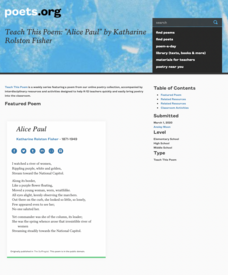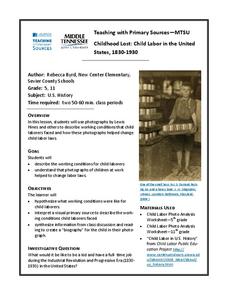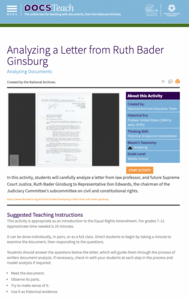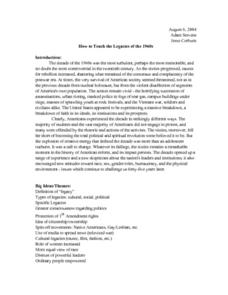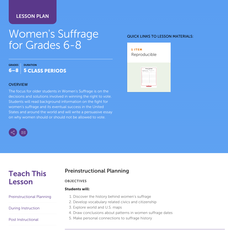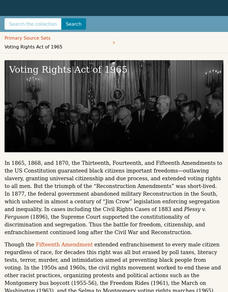Academy of American Poets
Teach This Poem: "Alice Paul" by Katharine Rolston Fisher
Powerful women need not look like Wonder Woman. After writing a paragraph about a strong woman they know, young scholars examine images of Alice Paul and then do a close reading of Katharine Rolston Fisher's poem "Alice Paul." Finally,...
Academy of American Poets
Teach This Poem: "When Fannie Lou Hamer Said" by Mahogany L. Browne
After watching an excerpt from a video of Fannie Lou Hamer's testimony before Congress, pupils do a close reading of Mahogany L. Browne's poem "When Fannie Lou Hamer Said," annotate words and phrases that draw their attention and list...
Curated OER
Bill of Rights
Students work in collaborative groups to research an amendment of the Bill of Rights. They then design and present a skit that demonstrates and communicates the core values and concepts of the amendment to the class.
Curated OER
Childhood Lost: Child Labor in the United States, 1830-1930
Working in groups, middle and high schoolers describe and discuss photographs depicting working conditions experienced by child laborers in the 19th century. They then write a persuasive paragraph supporting an amendment to regulate the...
Curated OER
The 1:1 Transition: Paving a Smooth Road for Students
Teaching expectations, routines, and skills make the transition smoother for students and teachers alike.
DocsTeach
Analyzing a Letter from Ruth Bader Ginsburg
Before her career as a Supreme Court Justice, the Notorious RBG was a legal activist for women's rights. Using a letter from then-Professor Ginsburg, young historians carefully examine a letter from Ginsburg to a member of Congress...
Curated OER
An Approach To Teaching Religious Tolerance
Students identify First Amendment rights of Freedom of Religion. They identify the colonies which were settled by people escaping religious persecution. They study the beliefs of the five major religions in the US.
Curated OER
How to Teach the Legacies of the 1960s
Students consider which aspects of world around them have roots in 1960s, research and compare 1960s to today with regards to Civil and Women's Rights, Vietnam, counterculture, music, voting, and economic rights, and explore legacy of...
Curated OER
"Pleading the Fifth" Self-Incrimination and the Fifth Amendment
Students examine how the Fifth Amendment protects against self-incrimination. They apply it to hypothetical situations by role playing as judges.
Curated OER
Rights of the Accused in Search and Seizure
High schoolers explain the rationale behind the Fourth Amendment, and the types of activity regulated by the Constitution. They analyze situations, and explain a citizen's rights when an unlawful search or seizure is conducted.
Scholastic
Women's Suffrage for Grades 6–8
Learners study the decisions and solutions involved in winning the right to vote. After reading background information on the fight for women's suffrage, including one woman's story, and its eventual success in the United States and...
Heritage Foundation
The Constitution, Federalism, and the States
The divide between federal and state government is responsible for much of tension that continues to this day, partly because of the US Constitution. The activities in the 14th lesson in a series of 20 are designed to help learners...
Curated OER
Regents Review Worksheet #1: Principles of the U.S. Constitution
Kids who take the Regents Exam really need to know a lot of information. This is a wonderful exam review tool that includes 26 pages of questions, charts, and suggested readings to help upper graders pass the test. It focuses on all...
Curated OER
The Juvenile Death Penalty
Sensitive material is discussed in this lesson. Please review to ensure that the content is suitable for your class. The topic is the Eighth Amendment and how the U.S. Supreme Court makes determinations about what constitutes cruel and...
Digital Public Library of America
Voting Rights Act of 1965
Despite the passing of the Thirteenth, Fourteenth, and Fifteenth Amendments, as well as the passing of the Voting Rights Act of 1965, the struggle to ensure fair voter registration and election procedures continues. Young historians...
Curated OER
Progressive Reforms
Tenth graders analyze editorial cartoons focusing on progressive reform. They compare their analysis and research. Students discuss the cost of reform leading to the creation of a national income tax through the passage of the 16th...
Curated OER
The First (and Last) Words
What does "freedom of speech" mean to your class, especially in the context of Internet communications? In round-table discussion format, middle and high schoolers address the issues discussed in "State Legislatures Across U.S. Plan to...
Broward County Schools
Women's Contributions to the United States
Betsy Ross, Toni Morrison, Sacajawea, Amelia Earhart, Maya Lin, Sally Ride, Judy Baca. No matter the subject area or the grade level you teach you will find much to value in a manual that focuses on the contributions U.S. women have...
Curated OER
Teaching about the First Amendment
Students defend the Constitution against a group of Senators who decide that all media must be approved by the government, all Americans must take a loyalty oath, join an official U.S. religion and subscribe to approved clubs.
Curated OER
Does Free Speech Exist in School?
Students examine their own First Amendment rights as students. They read and discuss a news article, discuss the Supreme Court case Frederick v. Morse, take an online quiz and conduct Internet research, and create a brochure outlining...
Curated OER
Freedom of Hate Speech?
Learners, using a New York Times article as a springboard for discussion, investigate and debate the complex issues of First Amendments Rights and censorship for Hate Groups using Websites for propaganda.
Curated OER
Scopes Trial Activity
Learners are able to prepare arguments for a moot court case. They know how the Scopes Trial impacts academic freedom today. Students know what constitutional amendments are applicable to this issue (including the Butler Act). They...
Center for Instruction, Technology, & Innovation
Did African American Lives Improve After Slavery?
The Civil War made slavery illegal, but all ex-slaves were not totally free. Scholars visit eight different classroom stations to uncover life during the Reconstruction Era in America. Groups discover items such as Black Codes, 13th,...
Ashbrook Center at Ashland University
Bill of Rights
Do citizens need protection from the federal government? Scholars investigate why the framers of the Constitution created the first 10 amendments and what these amendments mean to citizens of the United States more than 200 years later....


